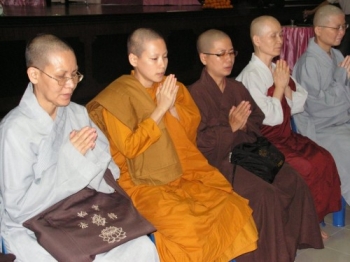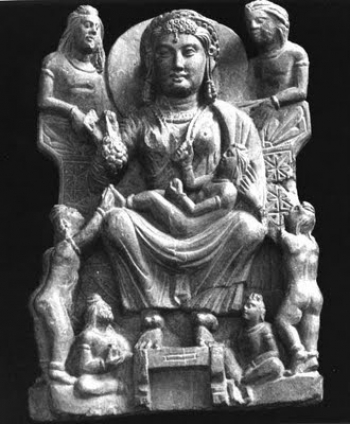The role of women in Buddhism, especially in Buddhist monasticism, has been a controversial topic of late. Ajahn Brahm’s recent ordination of nun’s into his Theravada lineage has caused great discussion and debate within the Thai forest tradition in the West. In addition, such debates on the ordination of nuns and the role of nuns in Buddhism have been going on for years within the Sri Lankan, Thai and Tibetan traditions. However, the struggle that many women face in being recognised as legitimate religious authorities is nothing new. One only has to look back at some of the earliest Buddhist texts to find numerous descriptions of the hardship nuns went through in their struggle for nirvana.
One of the most interesting and profound stories I have come across concerns a nun called Soma. Soma was one of the first nuns to enter the Buddhist order. The tradition states that Soma had become a lay disciple of the Buddha when she saw him on his first trip to Rajagaha. She later decided to renounce the world, joined the monastic order and eventually gained full enlightenment as an arahant (“A Worthy One”). One time, Soma had settled down at the foot of a tree in a dark grove and was prepared for a day of meditative absorption. However, Soma was not long in meditation before Mara, the Evil One, appeared, desiring to distract Soma and to stop her developing any spiritual attainments. In order to provoke and rile her, Mara declared loudly:
“That state which is obtainable by the Sages is difficult to reach;
It is not possible for a woman with housewife wisdom to obtain that.” (SN 1.128)
Soma recognised the voice of Mara and knew that he was attempting to break her concentration. She responded with two verses of compassionate wisdom to shatter Mara’s grip:
“For one who truly perceives the dharma – when the mind is composed and knowledge flows – what does being a woman matter?
Certainly, the speech of one who says 'I am a woman', 'I am a man' or even 'I am anything' is worthy of Mara, the Evil One.”
When Soma had uttered these verses Mara knew he had been discovered and vanished into thin air! These verses, arguably composed over two thousand years ago, provide a fascinating insight into a view of gender within the early Buddhist sangha. We can imagine that the nun’s faced discrimination from the patriarchal society of the day and that Mara in this passage perhaps represents the opinion held among some that women could not gain enlightenment. Soma has the wisdom to understand that the labels “man”, “woman” or any other term we may apply to ourselves or others are ultimately delusional and tied to cyclic existence. The mind that is liberated is free from an attachment to such concepts. One could say that enlightenment is genderless and equally accessible to all.
This teaching from Soma is as relevant today as it was then. In the modern world, often gender is the first characteristic we are distinguished by. For instance, gender is the first label we obtain when we are born and it is only later we officially get a name! One only has to look at the recent controversies surrounding the role of Buddhist nuns in the West to realise that we still have not listened to Soma’s wisdom. I feel that until we can finally put to rest our attachments to the names by which we label ourselves and the universe, and until these labels are not used for prejudice or persecution, we will still be speaking the language of Msra, distracted from the goal of liberation won by that wise nun Soma.
















